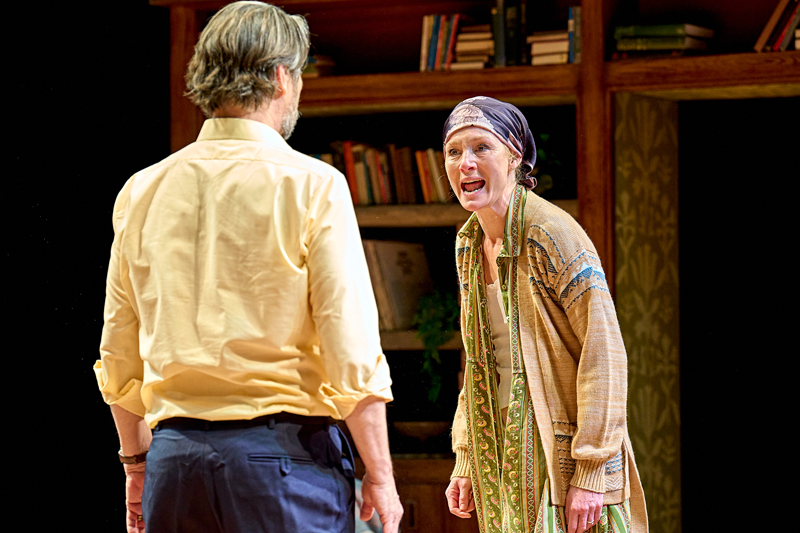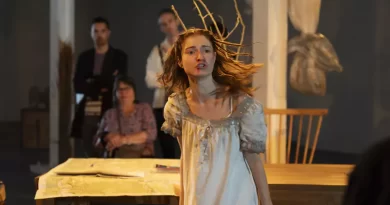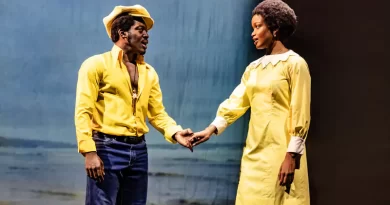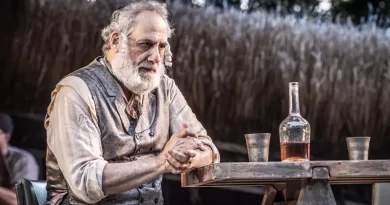“Rock ’n’ Roll” at Hampstead Theatre
Neil Dowden in north London
16 December 2023
The Cold War is back this winter – at least in north London theatres. Two shows with music at their heart opened on the same night this week: at the Almeida Theatre Cold War, a new adaptation of Paweł Pawlikowski’s 2018 film set mainly in post-war Poland and Paris; and at Hampstead Theatre a revival of Tom Stoppard’s Rock ’n’ Roll, which takes place in Prague and Cambridge between 1968 and 1990. This is the first time it’s been seen in the capital since its Royal Court/West End premiere in 2006. And though this sprawling play is slightly dated by its closer proximity to the period and more optimistic vibe in post-communist Europe, it remains a fascinating, multi-layered work here given an excellent production.

Jacob Fortune-Lloyd as Jan.
Photo credit: Manuel Harlan.
Alternating between academic Cambridge where politics is debated in luxurious freedom and Prague where airing alternative opinions leads to prison, Rock ’n’ Roll starts in the late sixties when the Prague Spring initiated by Dubček’s reformist government is brutally put down by Soviet tanks. It then follows the dissident campaign of the seventies, including the human rights protest of Charter 77 led by Václav Havel and others, and the corresponding backlash, before the eventual collapse of the communist regime in the 1989 Velvet Revolution.
That is the historical background but the drama focuses on several fictitious individuals and their clashing viewpoints. In particular, Jan, a young Czech PhD student enjoying the liberal ambience of Cambridge University, falls out with his professor Max, a committed Marxist who still believes the Soviet Union is on the right side of history, when he returns to Prague to support the threatened reform movement. Meanwhile, Max’s classics lecturer wife Eleanor, who is slowly dying of cancer, berates him for his lack of emotional intelligence, and their teenage daughter Esme apparently sees a Pan-like piper playing on the garden wall.
The heterogeneous ideas of the play are yoked together in characteristically ingenious ways by Stoppard. The pagan figure Esme espies is actually the shamanic former Pink Floyd front man Syd Barrett who self-destructed after taking too much of the psychedelic drug LSD and returned to his hometown of Cambridge where he became a recluse. He is a hero of Jan, who takes pride in his rock music record collection (later broken up by the communist secret police) and who after avoiding signing anti-government petitions finally goes to jail for backing the (real-life) underground band Plastic People of the Universe whose own jailing precipitated Charter 77. While they were not overtly political, their non-conformist, Western-influenced hedonistic lifestyle was seen as a threat. This also connects to Eleanor’s championing of Sappho’s ancient Greek poetry with its irrepressible erotic power similar to rock ’n’ roll.

Nancy Carroll and Nathaniel Parker.
Photo credit: Manuel Harlan.
Rock music suffuses this show: as well as The Piper’s fleeting appearances on stage, during scene changes we hear the likes of Velvet Underground, Led Zeppelin, U2, and the Rolling Stones who played a celebratory post-revolution concert to over 100,000 people in Prague – which marks the end of the play. Stoppard invited members of Plastic People to meet the original cast, and Mick Jagger as well as Havel attended the premiere in 2006. While opening night at Hampstead was a bit lower key, the 86-year-old Sir Tom was in attendance, having participated in rehearsals.
Returning to his Czech roots, Rock ’n’ Roll combines the political themes of collectivism versus individuality and state control versus freedom of expression in Stoppard’s Every Good Boy Deserves Favour and Dogg’s Hamlet/Cahoot’s Macbeth with the epic, multifaceted qualities of Arcadia and The Coast of Utopia. For a playwright best known for his wide-ranging cerebral discursiveness (as well as entertaining theatricality and witty humour), Rock ’n’ Roll contains a surprising amount of emotion (with even a late-developing love story) in Nina Raine’s well-balanced, lucidly staged production. Anna Reid’s wooden-framed conservatory-like design also features shelves lined with books and records plus a table in the middle around which passionate debates rage.
The multi-roling cast is first-class. As a likeably moderate Jan, Jacob Fortune-Lloyd ages convincingly from youthful idealism to subdued pragmatism learnt from bitter experience. Nathaniel Parker’s crusty Max sticks dogmatically to his hardened beliefs though his later disillusionment is reflected in physical frailty. Nancy Carroll doubles superbly as fiery academic mother Eleanor and yearning, poetry-writing daughter Esme. And the barefooted, guitar-strumming Brenock O’Connor plays the ghostly, anarchic figure of The Piper, just as the real Syd Barrett – who died during Rock ’n’ Roll’s first run – haunts the play.









